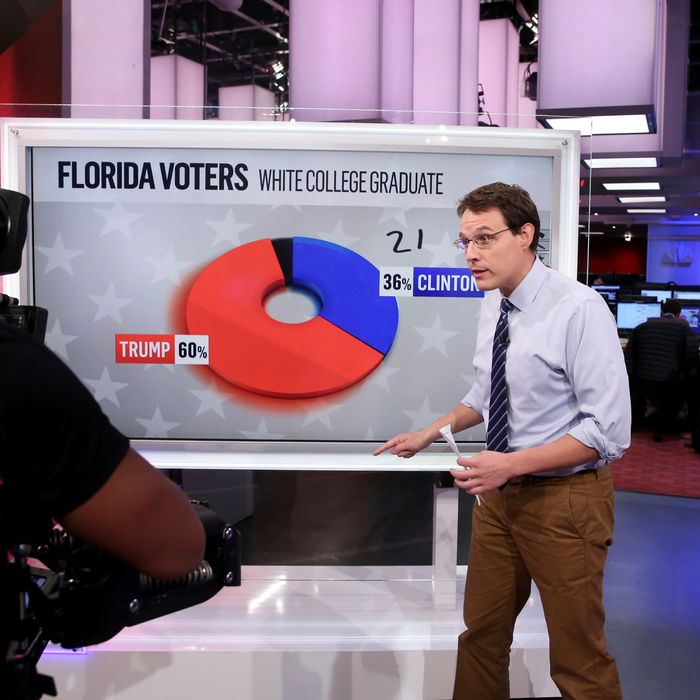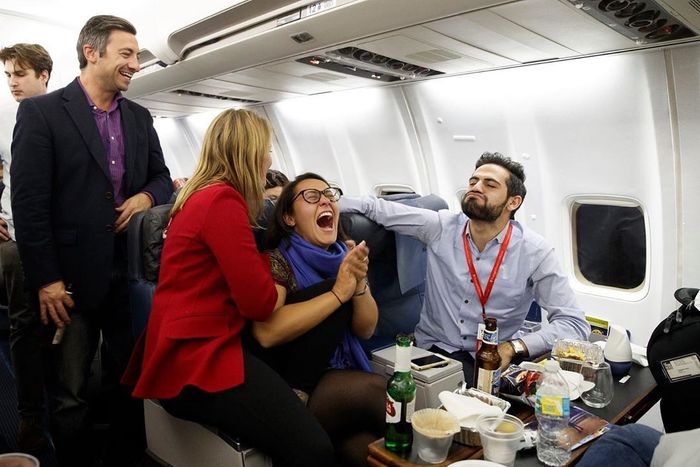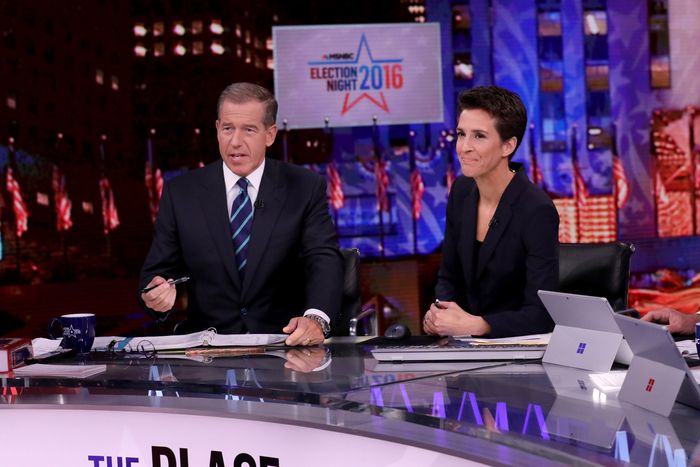
This article was featured in One Great Story, New YorkÔÇÖs reading recommendation newsletter. Sign up here to get it nightly.
As Election Day 2020 approaches, flashbacks to the last presidential election are inevitable. What most people remember about November 8, 2016 is the shock: the realization that Donald Trump, former host of The Apprentice, would be our next commander-in-chief. A lot happened on that day, the details of which may have been crowded out of many minds by, well, everything that has happened in this country since that day. But for the journalists at MSNBC who were out in the field or in the studio trying to process everything for the public in real time, much of what they heard and saw remains vivid. Several key reporters and anchors at MSNBC took a trip down memory lane with Vulture, through the Mannequin Challenges, the phone calls from an irked Sean Spicer, and a planned celebration for Hillary Clinton that turned into the worst kind of purgatory. Understandably, a lot of people would rather forget how those hours felt, but itÔÇÖs useful to remember as we head into another anxiety-inducing election day.
Sources: Monica Alba, NBC News political reporter; Shaq Brewster, NBC News political reporter; Kasie Hunt, anchor of Way Too Early With Kasie Hunt; Steve Kornacki, NBC News national political correspondent and worker of the big election results board; Katy Tur, anchor of MSNBC Live With Katy Tur; Ali Vitali, NBC News political correspondent; Brian Williams, anchor of The 11th Hour With Brian Williams.
Monica Alba, NBC News embed on the Clinton campaign in 2016: Election Day for us really began at 3:30 a.m. after a series of rallies Secretary Clinton had done the night prior. We had been in an arena where Lady Gaga was playing the piano and Jon Bon Jovi was dancing and singing on top of the piano. That was the jovial experience of that last plane ride when we landed in Westchester. The Clinton campaign was so optimistic, they were doing the Mannequin Challenge.
Secretary Clinton was not somebody who was optimistic at all throughout the campaign. She was always more serious and reserved. On that final night, she and her husband, former President Bill Clinton, were touchy-feely, hugging each other, making jokes to the press, coming back and talking to reporters.
Katy Tur, NBC correspondent covering the Trump campaign in 2016: Even though the Trump press corps had been pushing back on this idea that Donald Trump had no chance, the prevailing emotion was that Donald Trump was going to lose. So the mood on the press plane was, This is the end. ItÔÇÖs all over after this.
Kasie Hunt, NBC correspondent covering the Clinton campaign in 2016: We woke up after coming back from the rally the night before and went with Clinton to vote. We were all outside of the voting location. I said at some point that it didnÔÇÖt feel like covering a winning campaign in the final weeks. I had gotten laughed at by ClintonÔÇÖs staffers for saying that.
WeÔÇÖd drive out to Clinton events and there would be Trump signs along the road. I was always taught you donÔÇÖt use road signs or even crowd size to make assumptions about the state of a campaign. The reason is that those indicators can be artificial. But that way of doing it, honestly, was undermined in 2016. I wish I had followed my own instincts, what I was seeing with my own eyes, a little more aggressively when I was out there.
Tur: I spent the morning and afternoon inside 30 Rock, and I watched Donald Trump go to vote in Midtown Manhattan on our internal system. ItÔÇÖs New York City and he gets confronted with an overwhelming number of boos from the crowd. When he walked inside, some kids were selling cookies as part of a fundraiser for the school. He buys a couple of cookies off the kids, gives them $20, and then hands the bag of cookies to Melania and says, ÔÇ£IÔÇÖm going to eat these later.ÔÇØ
As election results came in, Tur and Ali Vitali set up camp at the New York Hilton Midtown, site of TrumpÔÇÖs post-election party; Alba was at the Javits Center, where the Clinton camp was preparing to give a victory speech; Williams anchored from the MSNBC studio at 30 Rock, where Kornacki and Hunt also reported on air.
Tur: Anthony, my producer, and I go to the Hilton at around five oÔÇÖclock. I noticed there was a cash bar. So unlike other victory parties, Donald Trump was charging for the booze. It wasnÔÇÖt like one of the presidentÔÇÖs big, giant 5,000-person rallies. This is a small room in the Hilton. It can only accommodate a few hundred supporters, and these arenÔÇÖt the supporters you see at rallies. These are his wealthy and well-connected friends around town. Stephen Baldwin was in the crowd, Alec BaldwinÔÇÖs brother. Alec BaldwinÔÇÖs famed for his impression of Donald Trump. His brother was in there celebrating, wearing a MAGA hat.
Ali Vitali, NBC News embed on the Trump campaign in 2016: Oh, there was a cake. It was brought out really early. It was a bust of Trump in a suit. It was one of the oddities that often popped up when you spent time around Trump and his events.
Alba: I remember getting to Javits, and it was such a giant building with so many reporters and people. Everybody was surprised to see the stage, which had been beautifully built by Greg Hale in the shape of the United States. It was such a production. Of course, the glass ceiling wasnÔÇÖt lost on anybody there.
Steve Kornacki: We routinely get exit polls at 5 oÔÇÖclock. All of a sudden we got a big batch, and they looked a lot like the polling had looked. Broadly speaking, they painted a picture of, itÔÇÖs not going to be the worldÔÇÖs most impressive victory, but Hillary looks like sheÔÇÖs getting what she needs here.
Vitali: I think around 5 oÔÇÖclock, my best source on the Trump campaign called me, half to check in and half to say heÔÇÖs not feeling bullish about the chances going forward. And also that the throwing under the bus process had already begun. The Trump folks were saying specifically in Florida that they didnÔÇÖt think the RNC had done enough, and generally, that mistrust between the RNC and the Trump campaign was starting to bubble up. It was something we thought would happen if the results looked bad, but we hadnÔÇÖt really seen results yet.
Tur: Already at five oÔÇÖ clock, you saw the knives coming out. Kellyanne Conway was on with Chuck Todd, and she was saying the same thing ÔÇö that the RNC didnÔÇÖt lend their full support.
I remember tweeting something about that and immediately getting a call from Sean Spicer, who at that time worked for the RNC. He was telling me, ÔÇ£No, itÔÇÖs absolutely not true. Where did you get that information?ÔÇØ I told him, ÔÇ£Well, Ali Vitali has the source information.ÔÇØ He says, ÔÇ£No, itÔÇÖs not true. Where did you hear that?ÔÇØ And I said, ÔÇ£ItÔÇÖs not just Ali Vitali, Sean. Kellyanne Conway just said it on television with Chuck.ÔÇØ I think Sean said something like, ÔÇ£She did?ÔÇØ And then he hung up immediately.
Kornacki: At about 7:45 at night, I was looking down at Miami-Dade County in Florida, and I was saying, ÔÇ£From the exit poll IÔÇÖve seen this looks like what was expected. They look like decent Democratic numbers. And yeah, I could see this being a Clinton night based on these numbers.ÔÇØ
In the next five minutes, I was looking at the numbers on the Gulf Coast and north of Tampa, and it was like, holy cow. Okay, youÔÇÖre expecting Trump to do decently here, but these are counties that Romney won by single digits and TrumpÔÇÖs going to win these counties by, like, 20. And then you started looking at the turnout and itÔÇÖs like: This is a flood.
Shaq Brewster, an NBC News producer in 2016: I was in Cincinnati, Ohio, at the Hamilton County Board of Elections. Despite Ohio being a swing state, in 2016, It was a very easy call [for Trump]. What we expected was what ended up happening.
Alba: In the 7 oÔÇÖclock to 9 oÔÇÖclock range, the Clinton staffers were huddled in their own back room, so we werenÔÇÖt interacting with them much. They wanted to be in the green room with the celebrities they had brought to the Javits Center. It was extremely apparent it was dawning on them that the map was not going to go in the direction they thought it was.
Brian Williams: Much of the data we were getting didnÔÇÖt make a whole lot of sense. At our network, we are simply not allowed to have contact with the decision desk during Election Night.┬á They are literally roped off in a separate newsroom.┬á We hear from them when they make a call.┬á We are their client in a one-way relationship. We are able to see the other networks on our studio monitors, but we cannot let it affect what we say on the air.┬á IÔÇÖve seen calls reversed, IÔÇÖve seen predictions go wrong.┬á A lot of predictions were wrong in 2016.
Vitali: Someone said Virginia was too close to call. Then someone from the Virginia Trump team happened to whiz by me outside the ballroom and they looked really harried and confused, but also a little excited at the prospect that maybe this wasnÔÇÖt an entire loss for the campaign.
Kornacki: It was somewhere right between those three ÔÇö Florida, North Carolina, and Virginia ÔÇö that it hit me that this was a very different night than had been expected.
Vitali: Around ten, a Republican staffer walks by me and heÔÇÖs visibly drunk. He says, ÔÇ£I have to sober up because I think he might win.ÔÇØ
Hunt: I went on the air and said something to the effect of, ÔÇ£All of these people that I had been talking to earlier in the evening had thought that Hillary Clinton was going to win. And now a significant number of them are saying it is possible that she is going to lose and that Trump is going to win the election.ÔÇØ We all know where Rachel Maddow stands on Trump, and I remember the look on her face was all of a sudden much different. I felt a little bit like ÔÇö obviously theyÔÇÖre my colleagues. They were very gracious to have me on the set. IÔÇÖm not trying to say anybody was not nice to me, but it was clear that, when I had this reporting to deliver, it was not terribly welcome news.
Alba: My friend and colleague Kristen Welker was in the Javits Center with me that night, and we were comparing notes. We were reaching out to everybody we knew collectively from being on the Clinton beat for a year and a half, and nobody was replying. ThatÔÇÖs when we really knew that they didnÔÇÖt even know what to make of what was happening.
Tur: As TrumpÔÇÖs prospects looked better and better, the crowd, which at this point had been drinking since five oÔÇÖclock, was getting rowdier and happier and more excited.
I think at one point around 9:30 ÔÇö and Fox News is on both the big screens ÔÇö Chris Wallace says, ÔÇ£I think Donald Trump could win. He could be the next president of the United States.ÔÇØ The whole room at the Hilton just explodes in this cheer. And as if Chris could feel the crowd in the room, even though he was in the studio in New York, he said, ÔÇ£Hold on, hold on. I just said maybe.ÔÇØ The crowd is still super-excited, but it wasnÔÇÖt until 11 oÔÇÖclock at night where things became abundantly clear. ThatÔÇÖs when they called Florida for Trump.
Williams: ThatÔÇÖs when we all collectively realized weÔÇÖd be covering a Trump inauguration in January.
Alba: There was a moment where all of the Clinton supporters just started to collectively sit down. They were zapped of energy and excitement and they were nervous. Some of them had moved on to tears. I remember seeing Lena Dunham, who went home before the thing was called, when the night was looking grim for the Democrats.
Hunt: Was it Lady Gaga who was crying backstage?
Alba: There was a guy who had been hired to do a live sketch or a painting of what everything looked like. I had checked in with that person a couple of times during the night, because he was standing, overlooking all the supporters.┬á I remember him saying midway through, ÔÇ£Uh-oh, I need to maybe start this over because the image I started to sketch is not the one IÔÇÖm ending with.ÔÇØ
Tur: When Donald Trump took Florida, it was like the cork was popped on the Champagne at the Hilton. Michael Cohen was running around the room like he was Paul Revere saying, ÔÇ£Which polls? Which polls?ÔÇØ, referring to an interview he had with CNNÔÇÖs Brianna Keilar, when she was saying all the polls showed Donald Trump losing.
Vitali: It was a very ÔÇ£I told you soÔÇØ atmosphere, which felt a little hypocritical given the fact that everyone on the campaign hadnÔÇÖt felt super bullish about their chances not four hours prior.
Alba: The Clinton campaign had turned the TV networks off and just put on the playlist. It was a little bit jarring to have people sitting on the floor, crying, with ÔÇ£Fight SongÔÇØ playing in the background.
Williams: The live split-screen coverage of the two New York venues told the story in real time ÔÇö the crowd milling around the Javits Center, shocked at the loss, and the crowd milling around the ballroom of the New York Hilton, shocked at the victory.
Vitali: Katy was sitting in a chair and I think I was sitting at her feet. My sources were already telling me Trump was going to be back on the rally circuit, doing a victory tour. YouÔÇÖre sort of primed as an embed that you run through the chaos of Election Night and then the next day, regardless of the results, you can breathe a little bit. Katy and I were talking about that and it was a very heavy feeling to know the chaos was going to keep going the way it had.
Tur: It wasnÔÇÖt about political party or partisanship. It was about this assault on truth and objectivity that I had been experiencing for all this time. I had security. I got death threats. The idea that he was going to keep on doing rallies after this, and I was going to live inside the press pen for the rest of my life, it was all washing over me. It felt like you canÔÇÖt breathe.
Alba: At the very end of the night, the boxes of confetti at the Javits Center that were going to be released were just sitting around. People were rifling through them, grabbing confetti for a confetti cannon that was never going to be fired off.
Tur: I walked from the ballroom back to my corporate apartment, and walking through Times Square, seeing Times Square completely empty, there was a silence that had washed over New York City streets in a way I had never experienced before. I think it was very clear that this was not like any other election. It was a feeling like, Oh my god. All of our lives are going to change.
In terms of this election, IÔÇÖm going into it with the knowledge of how everybody was in 2016, and how wrong they were on Election Night, and how sure everyone feels about Joe Biden in the polls right now, remembering that polling is an imperfect science. Also, being very humble to the fact that I am not out there on the road like our reporters are, so making sure I trust and I listen to and I get the most informative reporting out of our political reporters who have been out there and are talking to people.
Kornacki: The specific polling error in 2016 was one that redounded to TrumpÔÇÖs benefit, ultimately in the Midwest. That same error could happen again. A brand-new error could emerge in polling this year that also ends up being a plus for Trump, or it could go the other way completely. ThatÔÇÖs on my mind that, hey, if the polls are as off as they were in 2016 in those states, itÔÇÖs going to look very different.
Brewster: WeÔÇÖre always talking to voters, digging into what the energy is behind peopleÔÇÖs votes. Based on conversations with people who sat out in 2016 after voting in 2012 or 2008, I really do get the feeling that there are more people taking this seriously and coming out and making sure they vote.
Alba: At the same time, with this pandemic, itÔÇÖs been so much more difficult to get a consistent sense on the ground of whatÔÇÖs happening. I try to talk to voters wherever I go, but itÔÇÖs really been more challenging than four years ago. So in the final days and hours, IÔÇÖm going to have that in the back of my mind as well. How much are we not realizing, or what did we miss?
Williams: We are about to see if polling has become more accurate over the course of four years.┬á We are about to see if there is indeed a sizable and hidden Trump vote in places where weÔÇÖve been led to believe Biden has a sizable and consistent lead.┬á And we are about to see how democracy works during an uncontrolled pandemic. What could go wrong?
Interviews have been edited and condensed for clarity.




